Yellow Fever
What is yellow fever?
Yellow fever is a serious disease caused by the yellow fever virus.
Most people infected with yellow fever virus do not get sick or have only mild symptoms. People who do get sick will start having symptoms (e.g., fever, chills, headache, backache, and muscle aches) 3–6 days after they are infected. About 12% of people who have symptoms go on to develop serious illness: jaundice, bleeding, shock, organ failure, and sometimes death.
How does yellow fever spread?
Yellow fever virus is spread by mosquitoes.
Who is at risk?
Yellow fever virus, and the mosquitoes that spread the virus, are found in certain parts of South America and Africa. Travelers going to these places are at risk for infection with the virus. Check to see if yellow fever vaccine is recommended or required for your destination.
Yellow fever vaccine recommendations in Africa1,2

1Current as of November 2022. This map is an updated version of the 2010 map created by the Informal WHO Working Group on the Geographic Risk of Yellow Fever.
2Yellow fever (YF) vaccination is generally not recommended for travel to areas where the potential for YF virus exposure is low. Vaccination might be considered, however, for a small subset of travelers going to these areas who are at increased risk for exposure to YF virus due to prolonged travel, heavy exposure to mosquitoes, or inability to avoid mosquito bites. Factors to consider when deciding whether to vaccinate a traveler include destination-specific and travel-associated risks for YF virus infection; individual, underlying risk factors for having a serious YF vaccine-associated adverse event; and country entry requirements.
Yellow fever vaccine recommendations in the Americas1,2
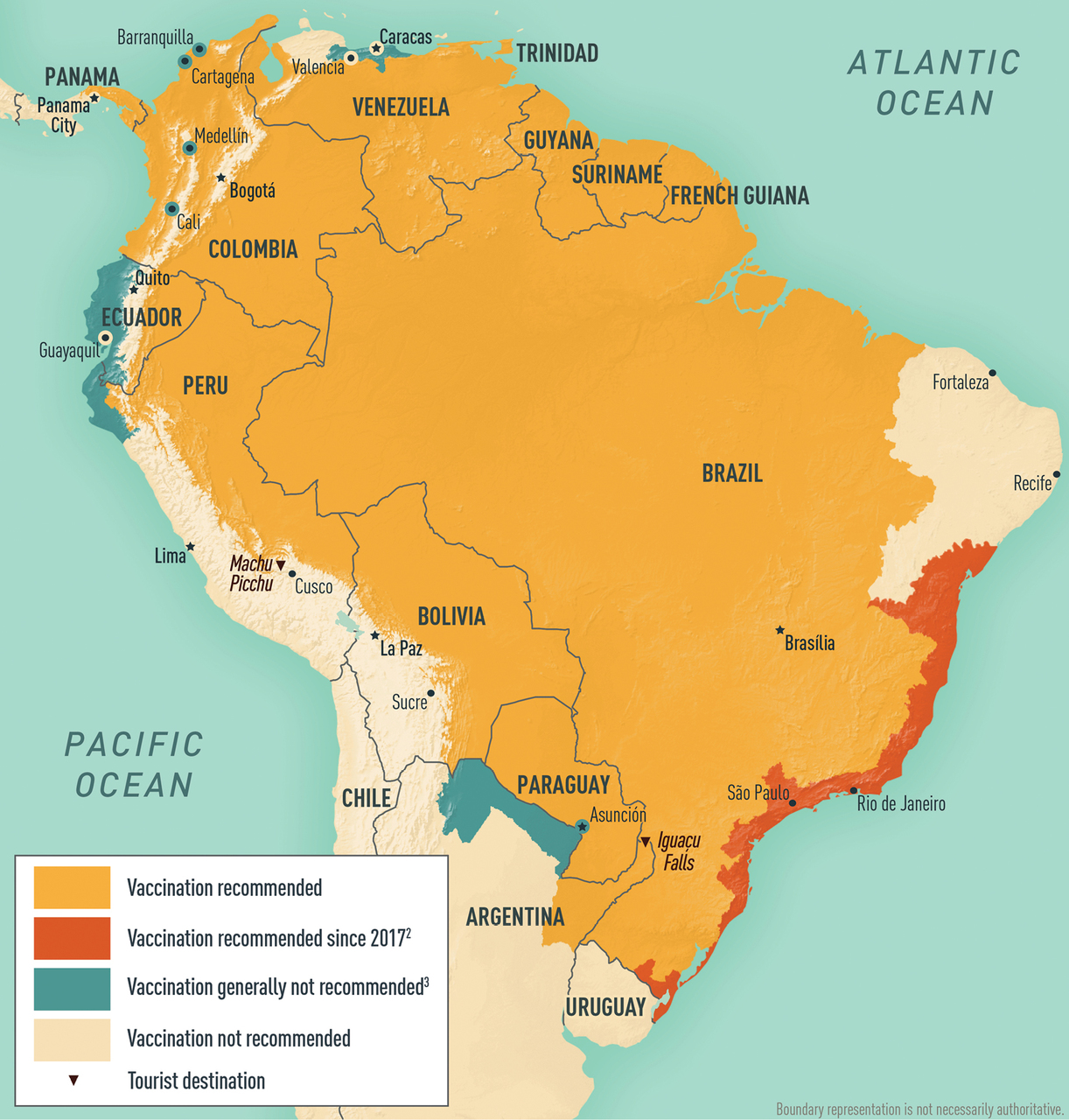
1Current as of November 2022. This map is an updated version of the 2010 map created by the Informal WHO Working Group on the Geographic Risk of Yellow Fever.
2In 2017, the Centers for Disease Control and Prevention (CDC) expanded its yellow fever vaccine recommendations for travelers going to Brazil because of a large outbreak in multiple states in that country. For more information and updated recommendations, refer to the CDC Travelers’ Health website.
3Yellow fever (YF) vaccination is generally not recommended for travel to areas where the potential for YF virus exposure is low. Vaccination might be considered, however, for a small subset of travelers going to these areas who are at increased risk for exposure to YF virus due to prolonged travel, heavy exposure to mosquitoes, or inability to avoid mosquito bites. Factors to consider when deciding whether to vaccinate a traveler include destination-specific and travel-associated risks for YF virus infection; individual, underlying risk factors for having a serious YF vaccine-associated adverse event; and country entry requirements.
What can travelers do to protect themselves?
Get the yellow fever vaccine and take steps to prevent mosquito bites.
Yellow Fever Vaccine: Requirements and Recommendations
Some countries may require arriving travelers to show proof of yellow fever vaccination. Countries do this as a public health measure to keep travelers from importing the virus. Proof of vaccination requirements may apply to some or all arriving travelers. CDC has no control over other countries’ vaccine requirements or how they are enforced.
Separate from the individual country requirements, CDC makes yellow fever vaccine recommendations for travelers going to countries where there is a risk of yellow fever. CDC recommendations are designed to help keep individuals from getting infected with yellow fever virus during travel.
Check your destination(s) for yellow fever vaccination requirements and recommendations.
Yellow Fever Vaccine: Getting Vaccinated
Visit a yellow fever vaccination clinic. Ask the health care provider at the clinic to confirm if vaccination against yellow fever is required and/or recommended for your destination(s).
Plan to get the vaccine at least 10 days before your travel since proof of vaccination is not valid until 10 days after getting the vaccine, the time needed to develop immunity to yellow fever virus.
A single dose of yellow fever vaccine protects most people for life, but a booster dose after 10 years may be recommended for some travelers. Talk to your health care provider for more information.
In rare cases, yellow fever vaccine can have serious and sometimes fatal side effects. People older than 60 years and people with weakened immune systems might be at higher risk of developing these side effects. Also, there are concerns for the babies of pregnant and nursing women who receive yellow fever vaccine. Before you get vaccinated against yellow fever, discuss your full medical history with your health care provider who can help inform you about the possible risks involved.
Yellow Fever Vaccine: Proof of Vaccination
The International Certificate of Vaccination or Prophylaxis (ICVP, sometimes called the “yellow card”) is your proof that you have been vaccinated against yellow fever. You will receive the ICVP when you get vaccinated. Along with your passport, present the original signed and stamped ICVP (not a photocopy or screenshot) to immigration officials in all countries requiring proof of vaccination.
Prevent mosquito bites:
Use an EPA-registered insect repellent
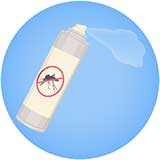
- Use Environmental Protection Agency (EPA)-registered insect repellents with one of the active ingredients below. When used as directed, EPA-registered insect repellents are proven safe and effective, even for pregnant and breastfeeding women. If also using sunscreen, always apply insect repellent after sunscreen.
- DEET
- Picaridin (known as KBR 3023 and icaridin outside the US)
- IR3535
- Oil of lemon eucalyptus (OLE)
- Para-menthane-diol (PMD)
- 2-undecanone
Find the right insect repellent for you by using EPA's search tool.
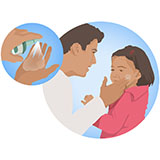
- Insect Repellent Tips for Babies and Children
- Dress your child in clothing that covers arms and legs.
- Cover strollers and baby carriers with mosquito netting.
- When using insect repellent on your child:
- Always follow label instructions.
- Do not use products containing oil of lemon eucalyptus (OLE) or para-menthane-diol (PMD) on children under 3 years old.
- Do not apply insect repellent to a child’s hands, eyes, mouth, cuts, or irritated skin.
- Adults: Spray insect repellent onto your hands and then apply to a child’s face.
- If also using sunscreen, always apply insect repellent after sunscreen.
Wear long-sleeved shirts and long pants
Treat clothing and gear with permethrin
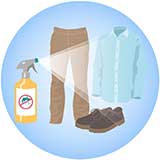
- Use 0.5% permethrin to treat clothing and gear (such as boots, pants, socks, and tents) or buy permethrin-treated clothing and gear.
- Permethrin is an insecticide that kills or repels insects like mosquitoes and sand flies.
- Permethrin-treated clothing provides protection after multiple washings.
- Read product information to find out how long the protection will last.
- If treating items yourself, follow the product instructions.
- Do not use permethrin products directly on skin.
- Watch the CDC video How to Use Permethrin.
Keep mosquitoes out of your hotel room or lodging
- Choose a hotel or lodging with air conditioning or window and door screens.
- Use a mosquito net if you are unable to stay in a place with air conditioning or window and door screens or if you are sleeping outside.
Sleep under a mosquito net
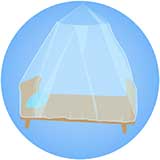
- Sleep under a mosquito net if you are outside or when screened rooms are not available. Mosquitoes can live indoors and bite during the day and night.
- Buy a mosquito net at your local outdoor store or online before traveling overseas.
- Choose a mosquito net that is compact, white, rectangular, with 156 holes per square inch, and long enough to tuck under the mattress.
- Permethrin-treated mosquito nets provide more protection than untreated nets.
- Permethrin is an insecticide that kills mosquitoes and other insects.
- To determine if you can wash a treated mosquito net, follow the label instructions.
If you are bitten by mosquitoes, avoid scratching the bites and apply over-the-counter anti-itch or antihistamine cream to relieve itching. See Mosquito Bite Symptoms and Treatment.
If you are bitten by mosquitoes:
- Avoid scratching mosquito bites.
- Apply hydrocortisone cream or calamine lotion to reduce itching.
After Travel

If you traveled and feel sick, particularly if you have a fever, talk to a healthcare provider and tell them about your travel.
If you need medical care abroad, see Getting Health Care During Travel.
More Information
- FAQ’s about Yellow Fever
- Avoid Bug Bites-Information for travelers
- Yellow Fever Vaccine Requirements and Recommendations, by Country
- Authorized U.S. Yellow Fever Vaccine Centers
- CDC Yellow Book: Yellow Fever